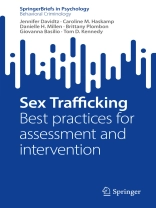This Brief proposes best practices for assessment and intervention with sex trafficking survivors, rooted in the existing theory and practice literatures. Based in current research and clinical practice, these recommendations are embedded in the context of cultural sensitivity. This volume provides a relevant, practical, and informative outline of sex trafficking, associated legal aspects, and best practices for mental health clinicians to aid in successful treatment of sex trafficking survivors.
विषयसूची
1. Introduction.- 2. Legal aspects.- 3. Assessments and measures.- 4. Theories.- 5. Interventions.- 6. Cultural considerations.- 7. Summary.
लेखक के बारे में
Jennifer Davidtz is an Associate Professor in the College of Psychology at Nova Southeastern University, where she is also the Director of Internship Training for the Psychology Services Center, and Director of Psychological Services for the Emotionally Distressed, a specialty program within the PSC that serves people with serious mental illness and personality disorders. She completed her doctoral training in Clinical Psychology at the University of Massachusetts Amherst, followed by a doctoral internship at The Harvard Medical School/Cambridge Hospital and post-doctoral fellowship at Harbor-UCLA Medical Center. Dr. Davidtz’s clinical and scholarly interests include community psychology, social justice, and the person in context; the treatment of serious mental illness, personality disorders, and complex posttraumatic and dissociative conditions; clinical psychology training and therapist development; contemporary relational psychodynamic approaches to psychotherapy; countertransference and other intersubjective psychotherapy process phenomena; and psychotherapy integration. She also maintains a part-time private practice specializing in the treatment of borderline personality disorder, complex PTSD, and dissociative disorders.
Caroline Haskamp is a doctoral candidate in the Clinical Psychology program at Nova Southeastern University (NSU) with a concentration in forensic psychology. Caroline currently holds a master’s degree in Clinical Psychology from NSU. Her primary clinical interests include first responder populations; high-risk and system-involved youth; individuals with serious mental illness including trauma and personality disorders; and forensic populations. Her primary research interests are focused on sex trafficking, first responders, complex trauma, forensic psychological evaluations, and serious mental illness. She has also obtained clinical experience working in inpatient behavioral health, outpatient for youth, families, and individuals with serious mental illness, youth and adult diversionary programs, and correctional settings. In addition, Caroline has served as a trainer for law enforcement officers, crime scene investigators, firefighters, and support staff in Crisis Intervention Training, Peer Support Training, and Behavioral Health Training.
Brittany Plombon is a Forensic Postdoctoral Fellow at the Utah State Hospital and the Utah Department of Human Services. She completed her doctoral training in Clinical Psychology (Forensic Concentration) at Nova Southeastern University, followed by a doctoral internship within the Forensic Track at the Utah State Hospital. Her primary research and clinical interests are focused on assessments and forensic psychology; individuals with serious mental illness; and first responders. She currently conducts court-ordered forensic evaluations (e.g., competency, violence risk, criminal responsibility, etc.) of inpatient, outpatient, and incarcerated defendants within the Utah criminal justice system. She has served as a presenter and lecturer on Behavioral Health and Peer Support Training for law enforcement professionals and fire rescue personnel. Lastly, she interned with the FBI as a part of their Honor’s Internship Program.
Danielle Millen is the Clinical Director of Manhattan CRAN with EAC Network and an Adjunct Professor for the College of Psychology at Nova Southeastern University. She completed her doctoral training in Clinical Psychology at Nova Southeastern University, followed by a doctoral internship within the Forensic Track at NYU-Bellevue. Her primary research and clinical interest are focused on assessments and forensic psychology. She currently conducts comprehensive assessments to address the mental health needs of individuals with severe mental illnesses who are reentering New York City from Rikers Island. She has published book chapters and written articles in the areas of juvenile suicidality and crime, psychological assessment, intimate partner violence, and malingering.
Giovanna Basilio is a psychology trainee in the clinical Psy D program and forensic concentration at Nova Southeastern University (NSU). She currently holds a Master of Science degree in Clinical Psychology. Her research interests include the impact of potentially traumatic events across immigrant and non-immigrant populations, as well as best practices for the assessment and treatment of United States immigrants. She has clinical experience with children, adolescents, adults, and older adults across correctional, community, and health care settings.
Tom Kennedy is an Associate Professor for the College of Psychology at Nova Southeastern University (NSU). He serves as a representative for the NSU IRB and is the site supervisor for the forensic practicum. He received his Ph D from the University of Miami. He previously served as Associate Professor for the College of Education at NSU where he was co-director of the Applied Research Center and developed and taught multiple courses including: Methods of Inquiry, Statistics, Advanced Statistics, Research Design, Mixed Methods, Program Evaluation, Survey and Measurement and Testing. His clinical experience consists of providing forensic evaluations, neuropsychological assessments, behavioral medicine interventions, and child and adolescent therapy in inpatient and outpatient settings including: the University of Texas Southwestern Medical Center, UM Mailman Center for Child Development, Jackson Memorial Hospital, UM Institute for Individual and Family Therapy, and the Dallas County Jail. Before coming to NSU, he spent five years at the Mailman Center for Child Development, where he trained and supervised school psychologists and assessed children throughout Miami-Dade County Schools.He is board certified in Biofeedback. His research interests include three convergent forensic tracks, one focused on at-risk children and adolescents, the other on domestic violence and human trafficking, and a third on the reliability and validity of psychological instruments used in forensic evaluations. He has procured grant funding and served as lead evaluator for multiple organizations including Catholic Charities, Miami Dade-Schools Police, and national Bullying programs. He has published books and book chapters, and written articles in the areas of juvenile crime, psychological assessment, bullying, psychophysiology and research design.












